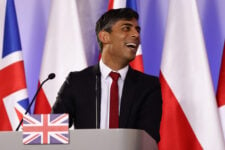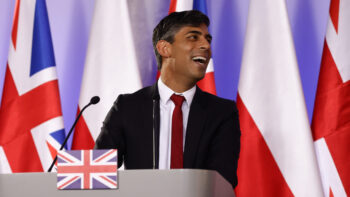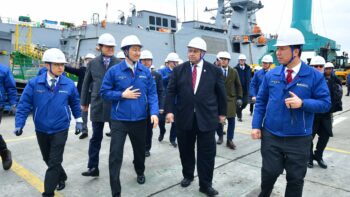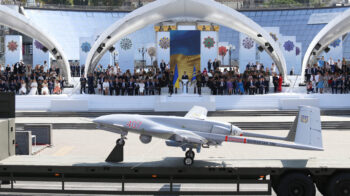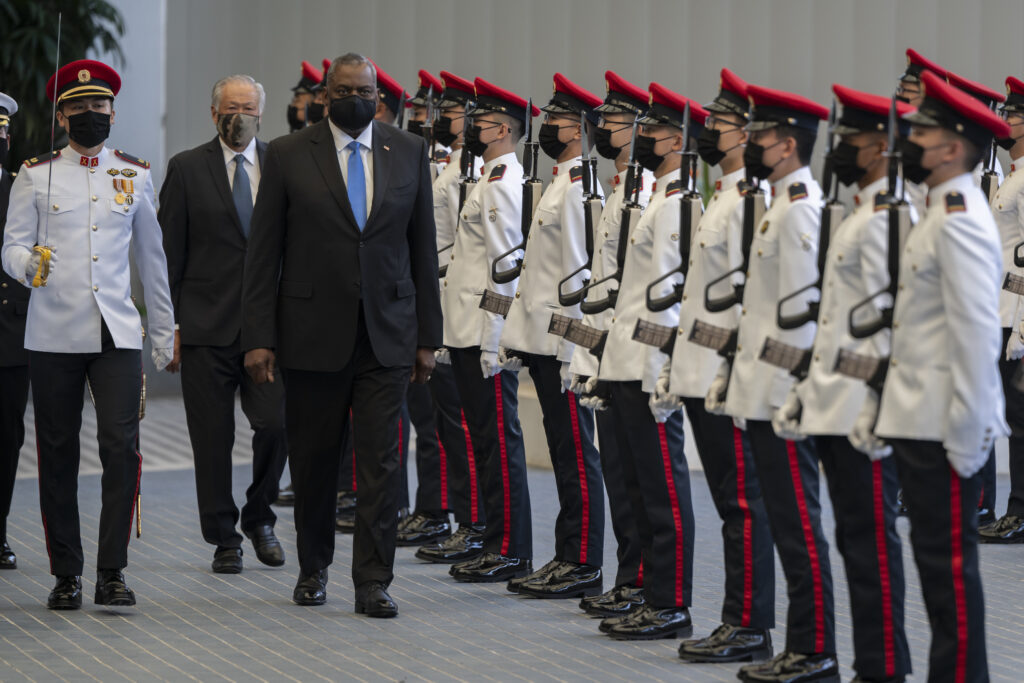
Defense Secretary Lloyd Austin is welcomed by Singapore’s Minister of Defense, Ng Eng Hen, July, 27, 2021.
WASHINGTON: Speaking in Singapore, the unique city-state perched on the eponymous strait through which so much Chinese shipping passes, US Defense Secretary Lloyd Austin made clear to the other Pacific countries facing a rising China “in difficult times” that America would both help and defend the liberal world order across the region.
“Today, amid this merciless pandemic, we stand together at another hinge moment… and we face another choice between the power of partnership and the dangers of division,” Austin said in a speech hosted by the International Institute for Strategic Studies. “I am confident that — through our collective efforts — the Indo-Pacific will again rise to the challenge. And America will be right at your side, just as an old friend should.”
He offered concrete proof of America’s efforts, noting that “in just the past two months, we have shared some 40 million (vaccine) doses throughout the region, including Indonesia, Laos, Malaysia, the Philippines, South Korea, Taiwan, Thailand, and Vietnam.”
The US “has been rushing urgently needed assistance across the Indo-Pacific. That includes testing equipment, oxygen supplies, PPE, ventilators, and storage for vaccines,” Austin said. The Indo-Pacific “is a top priority for some of the more than 500 million shots the US has pledged to the world for the next year.” In addition, the so-called Quad of India, Japan, Australia, and the US has “committed to producing and delivering a billion vaccine doses, right here in the Indo-Pacific.”
From the US, Austin said, “these vaccines are free. No conditions. No small print. And no strings attached. Because this is an emergency. And that’s what friends do.”
Austin presented a stark choice for China and every other Indo-Pacific country, saying the region can rebuild “in an even stronger rules-based international order. And that means more security… more stability… more prosperity… more resilience… and more openness.” Of course, China opposes that rules-based order, arguing it was constructed without its help by the West and does not represent China’s interests.
In many ways, the speech hit on traditional US talking points about the region. However, Greg Poling, an expert on China’s actions in the South China Sea (SCS) at the Center For Strategic and International Studies’ Asia Maritime Transparency Initiative, tweeted this morning that Austin’s speech did mark a shift in one respect:
“On the SCS, Austin never used the now problematic slogans ‘freedom of navigation’ or ‘fly, sail, and operate.’ He instead talked about SEA ‘rights and livelihoods’ and ‘fishing rights and energy resources afforded under international law.’ A welcome change.”
Of course, Austin did explicitly mention what he called, “A profound commitment to transparency, inclusion, and the rule of law. A dedication to freedom of the seas.” That would certainly remind China of freedom of navigation.
Allies and Equipment
Austin mentioned the importance of allies and partners repeatedly in his speech, at one point stating that “Our network of alliances and friendships is an unparalleled strategic asset. And I never take an ally for granted.”
While such comments were also made by secretaries during the Trump administration, few world leaders seemed to believe them, given President Trump’s many public statements about allies not doing their fair share. The Biden team has put significant effort into trying to reassure partners and allies that America remains committed to those relationships. He noted that the US is “working with our hosts here in Singapore to enter a new phase in cyber-defense cooperation. We’re partnering with Japan to deploy new sensors in space to better detect potentially threatening behaviors… and exploring similar opportunities with other friends.”
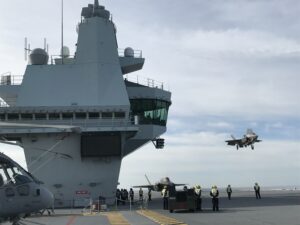
A Marine Corps F-35 lands on the deck of HMS Queen Elizabeth (photo: Paul McLeary)
And the secretary did not shy away from criticizing China’s actions, both regionally and on human rights. “Unfortunately, Beijing’s unwillingness to resolve disputes peacefully and respect the rule of law isn’t just occurring on the water. We have also seen aggression against India… destabilizing military activity and other forms of coercion against the people of Taiwan… and genocide and crimes against humanity against Uyghur Muslims in Xinjiang,” he said.
“We will not flinch when our interests are threatened. Yet we do not seek confrontation,” Austin said. “So let me be clear: As Secretary, I am committed to pursuing a constructive, stable relationship with China… including stronger crisis communications with the People’s Liberation Army.”
That reference to crisis communications is intriguing. Back in 2014, a commitment was made to setting up some sort of video hotline but it has not gotten anywhere. The Biden Administration has made it a goal to renew that effort.
In a nod to growing importance of the F-35 in Asia, Austin said he was “especially pleased that Singapore has chosen to invest in the F-35 Joint Strike Fighter. That’s going to boost our collective capabilities… and open up new opportunities for high-end combined training.” Singapore plans to buy at least 12 F-35Bs for $2.75 billion, a sale that has long been in the works.
He also referred to what the called “Britain’s historic deployment of a carrier to the Pacific. The HMS Queen Elizabeth is sailing through this region as the flagship of a multi-nation carrier strike group that includes a US destroyer and a US Marine Corps F-35 squadron.”
In an intriguing preemptive strike at any Chinese or Russian efforts to besmirch the liberal world order values of transparency and law, Austin noted that “our democratic values aren’t always easy to reach. And the United States doesn’t always get it right.
“We’ve seen some painful lapses, like the unacceptable and frankly un-American discrimination that some Asian Americans and Pacific Islanders have endured in my country in recent months,” Austin said. “I believe that we’re better than that. Far better. But we aren’t trying to hide our mistakes. When a democracy stumbles, everyone can see and hear it. It’s broadcast in loud and living color, and not hushed up by the state.”
In an eloquent and simple manner, he wrapped up the speech with a message to those in the region with ties to America:
“Geography has made us neighbors, as President Kennedy once put it. But vision and values have made us friends.”
UK pledges ‘generational’ leap in defense spending, industry to go on ‘war footing’
Under the new plan, London wants to spend a cumulative extra of £75 billion ($93 billion) over the next six years, culminating in a 2030 annual defense budget of £87 billion ($108 billion), which would make it second in NATO only to the US in defense expenditure.
